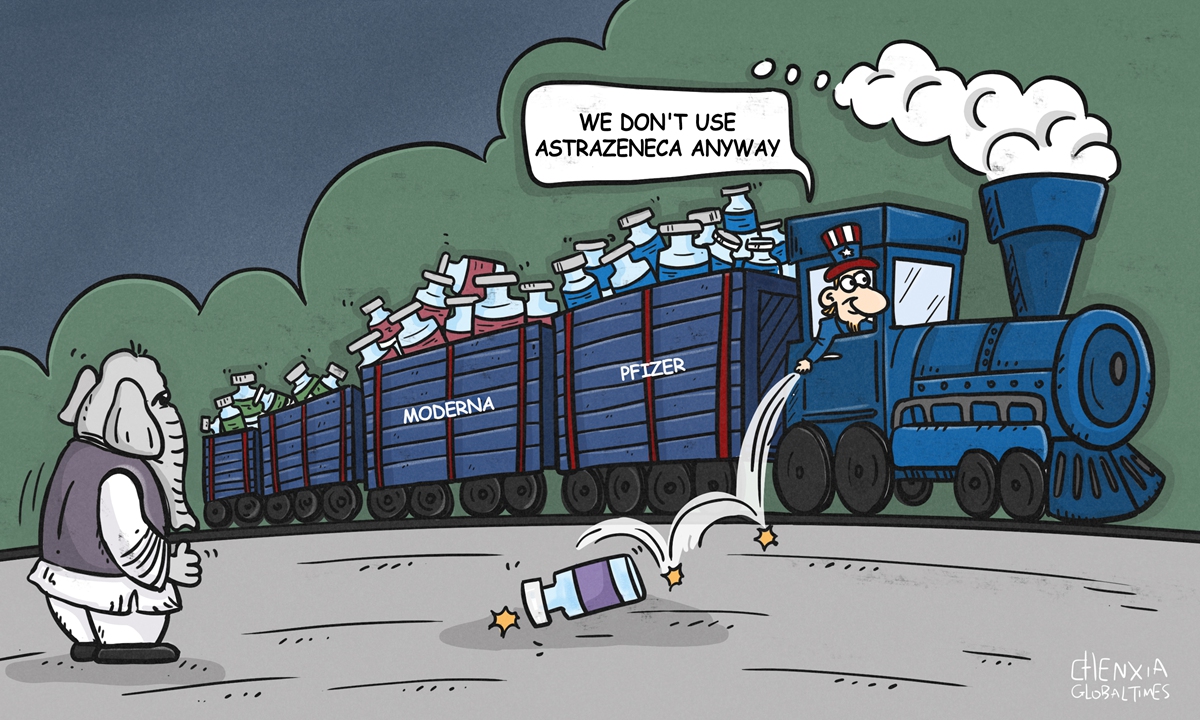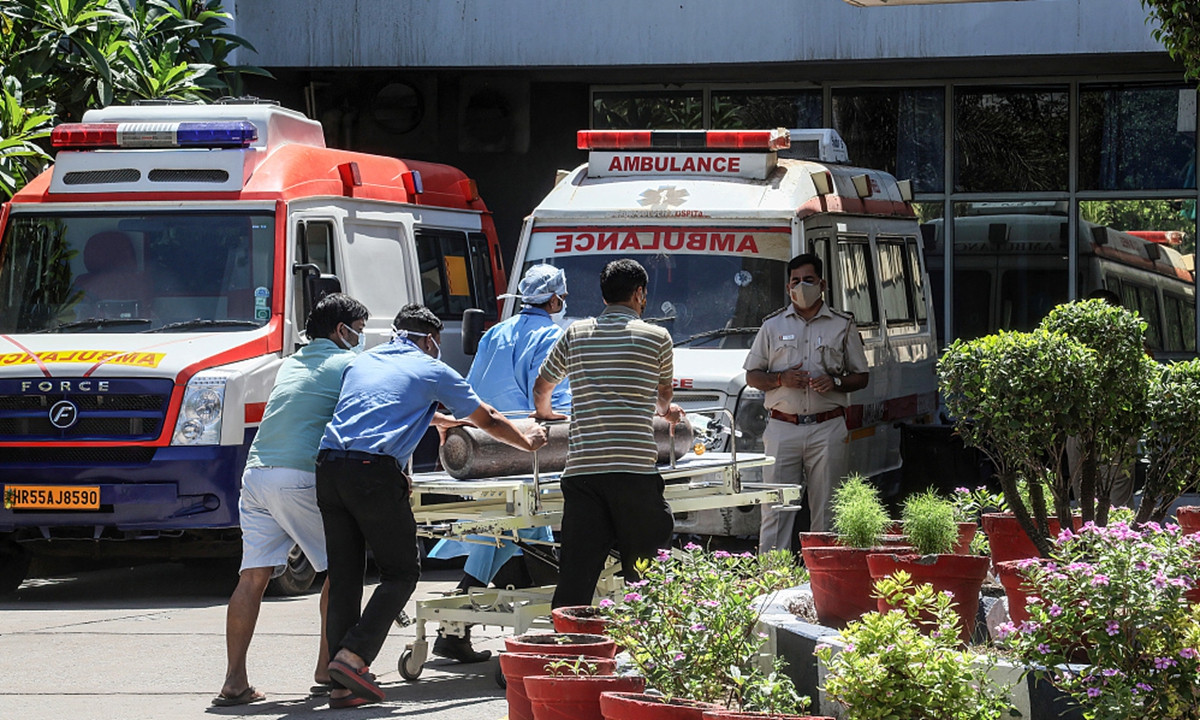
Illustration: Chen Xia/GT
When the US sets priority on vaccines, it takes it, even as many countries in the rest of the world are suffering from a deadly pandemic and in desperate need for vaccines and raw materials - for example, its partner India is battling with a catastrophic second wave with hundreds of thousands of daily new infections - which unexpectedly exposed the US' ruthlessness and indifference to the world.
Whilst Washington is sitting on tens of millions of vaccines and reluctant to share with others, countries in desperate need of vaccines are watching. Stockpiling the COVID-19 vaccines may help accelerate the US vaccination pace for now, but such selfish deed also undermines the country's shaky leadership and credibility in international society, Chinese analysts warned.
The US will likely have 300 million or more excess doses of vaccines authorized in the US and/or EU by the end of July, based on existing authorizations and purchase agreements, while the poorest countries have barely begun vaccinating due to lack of funding and supply, according to a recent report from Duke University.
This is due to the US government's early entry into advance purchase agreements and financial support and/or assistance to rapidly scale up vaccine manufacturing capacity for vaccines produced by Pfizer/BioNTech, Moderna, Johnson & Johnson, AstraZeneca, and NovaVax, read the report.
Data compiled by Airfinity, a London-based science intelligence platform dedicated to COVID-19, shows that out of the 164 million COVID-19 vaccines the US manufactured up to March, none were exported while the EU exported 42 percent of the 110 million doses it produced by the same month.
By contrast,
Chinese producers Sinovac and Sinopharm have exported some 200 million doses, the Global Times learned Tuesday.
Early overbuy Even with abundant vaccine stockpile, it is only until very recently the US agreed, under tremendous pressure of international society, to share 60 million doses of AstraZeneca's coronavirus vaccine with other countries in the coming months, the White House announced on Monday.
The inventory of COVID-19 vaccines in the US is beginning to pile up as the country has obtained huge amount of vaccines and now as the infectious curve in the US has flattened, the demand in this country is also dropping, Chen Xi, an assistant professor of public health at Yale University, told the Global Times on Tuesday.
He noted that the time has come for the US to share the doses they purchased in advance but will in all likelihood never use, such as the AstraZeneca doses that have not been approved in the US, experts noted.
In face of rampant COVID-19 waves, the US has initiated Operation Warp Speed as early as 2020 May to accelerate vaccine development for the country. Then the US government has subsidized the COVID-19 vaccine candidates to speed up their research. Pfizer and Moderna have been granted emergency use in December last year, which paved way for the US massive vaccination.
The latest Duke University report on April 15 said that manufacturing capacity of the five biggest COVID-19 vaccine manufacturers that have advance purchase agreements with US is continuing to ramp up, with nearly 200 million doses per month expected in June and July and over 300 million per month by fall.
Such large amount has enabled the US to vaccinate an average of 2 million per day in March, according to the country's CDC. Just then, US President Joe Biden announced another purchase of 100 million Johnson & Johnson vaccines.
According to calculation, the US has already ordered more than 800 million doses vaccines, which means there are 100 million excessive doses if everyone in the US gets one jab in their arms.
Meanwhile, tens of millions of doses from AstraZeneca are sitting idly in American manufacturing facilities for trial results while countries that have authorized the vaccine beg to have them, according to the New York Times.

India epidemic Photo: VCG
Grab resources for "Americans 1st" The US is one of the world's four major producers of coronavirus vaccines — along with China, India and the EU — and the only one that has not exported a significant number of doses. In addition to stockpiling nearly all doses produced in the US, the Biden administration also used the Defense Production Act to ensure priority access to the raw materials needed to produce vaccines.
India, who is battling the catastrophic second wave currently, has been requested medical aid from the US such as raw materials for vaccines and oxygen concentrators as the US banned exports of 37 materials that are vital to vaccine production in India. The Biden administration has only partially lifted the ban, under growing pressure from vaccine producers.
Zhuang Shilihe, a Guangzhou-based vaccine expert, said that the US has absolute monopoly on mRNA technology. That is why they applies export ban at this emergency time to ensure American producers such as Pfizer to get abundant material supply.
And American procures would not rely on one subcontractor in production. They would divide production procedure and delegate each step to different manufacturer while grabs the core technology in their own hands, Zhuang told the Global Times on Tuesday.
The US companies have also divided up vaccine production procedure and are working with different manufacturers in different countries or regions to increase production efficiency.
According to the BBC, it is now the norm for US companies to have their COVID-19 vaccines manufactured in one location, but "filled and finished" and prepared for export in another. For example, the Moderna vaccine is produced in Switzerland and put into vials in Spain. And the UK company Croda is supplying a component to Pfizer to make its vaccine, and a factory in Normandy, France, will fill vials.
According to a report by the Bureau of Investigative Journalism published in partnership with STAT, Latin American countries have accused Pfizer of "high-level bullying" during COVID-19 vaccine negotiations.
Pfizer reportedly forced Argentina, Brazil and other Latin American countries to pledge sovereign assets such as diplomatic missions, federal bank reserves and military bases as collateral to protect its drug companies from lawsuits related to vaccines.
Global experts, including those in the US, have been making suggestions to the US administration to abandon vaccine nationalism and help promote global vaccines distribution by measures like breaking monopoly, exempting intellectual property rights and accelerating production capacity.
But it seems like the Biden administration does not have the intention to accept any of the suggestion, said Zhang Tengjun, an assistant research fellow at the China Institute of International Studies. He noted that the Biden administration still absolutely upholds "America First" principle, as aiding other countries might lead to domestic backlash, which may not be conducive to his governance, something Biden doesn't want to see at the early stage of his presidency.
Yet experts said that the US selfish deed to stockpile vaccines is for the world to see. Biden aims to restore the US global leadership, but it is turning against its close allies and partners who are in difficulties, said experts, noting that being a world leader means more responsibilities, now the US is just angering other countries.





